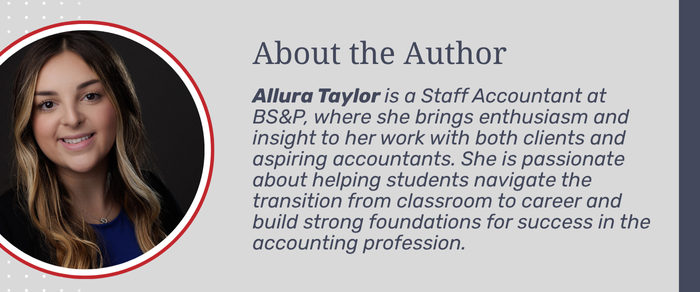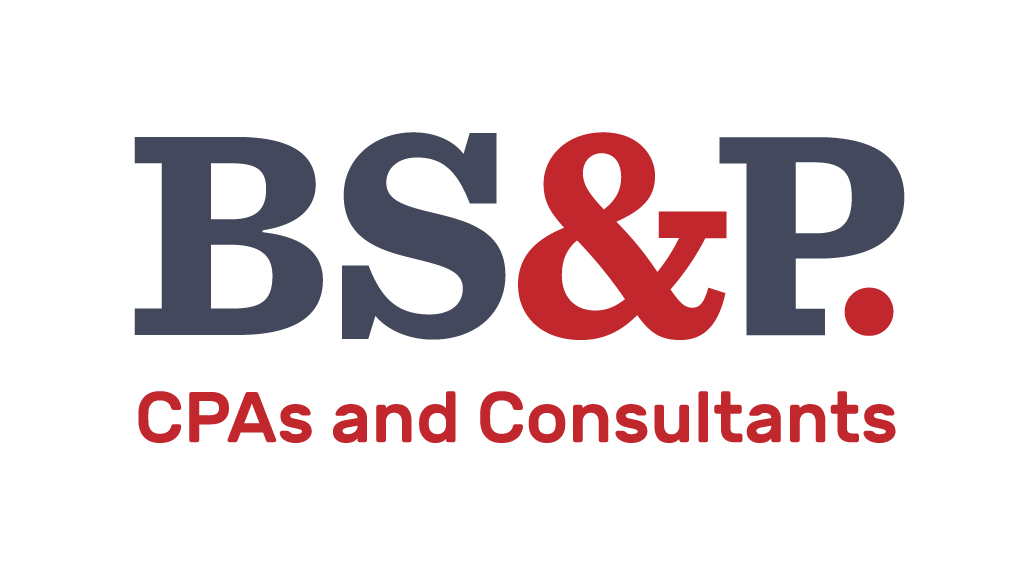Welcome to the first installment of “Your CPA Starter Pack”, a three-part series by BS&P’s Staff Accountant Allura Taylor that breaks down what you can expect-and how you can thrive-as you start your career in accounting!
Graduating from college and starting your first job as an accountant is a major milestone—and let’s be honest, a bit of a reality check too. One day you’re cramming for exams and tracking group projects, and the next you’re balancing actual financial statements, attending meetings, and figuring out how to use the office coffee machine. It’s a big change, but with the right mindset (and maybe a good spreadsheet template), you’ll adjust in no time.
Here’s a friendly look at what to expect—and how to thrive—as you make the shift from student life to working as a professional accountant.
🎓 College vs. Work: What Really Changes?
In college, everything was structured: clear deadlines, study guides, and maybe a late-night pizza run to power through assignments. In the workplace, structure still exists—but it’s often driven by clients, tax seasons, or month-end deadlines. And instead of feedback from a professor, you’re now receiving feedback from managers, clients, or audit teams.
The good news? You’re not expected to know everything from day one. Employers understand that recent grads are still learning, and most teams are ready to support you as you get settled in. Be a sponge. Ask questions, take notes, and don’t be afraid to say, “I’m not sure, but I’ll find out.” Senior colleagues are often happy to help if they see you’re eager to learn. Every day will teach you something new, even (especially!) your mistakes.
🧠 You’re Still Learning—Just in a New Way
Accounting is one of those careers where real-life experience adds a whole new dimension to what you learned in the classroom. Whether it’s preparing financial reports, navigating accounting software, or interpreting tax rules, you’ll quickly realize there’s always more to learn.
Tip: Don’t be afraid to ask questions. It shows curiosity and a willingness to grow. Also, take notes—you’ll thank yourself later during month-end close when everything feels like it’s happening at once.
👔 Adapting to Office Life
Trading in hoodies for business casual might be one of the most obvious changes, but it’s more than just clothes. Office culture includes learning how to interact with coworkers, communicate professionally, and manage your time without the structure of a class schedule.
Tip: Be on time, stay organized, and be open to feedback. Find a rhythm that works for you. Get up early enough to have a calm start to the day. Pack snacks. Use a planner or app to manage your daily tasks. Building good habits early helps you gain trust—and feel more confident. And outside of work, make time for things that recharge you: hobbies, friends, exercise, or just a solid nap. If your role involves long stretches at a desk, build in breaks to move around and rest your eyes. Blue light glasses will be your friend in the beginning! And yes, coffee might just become your new best friend — though for someone like me who doesn’t like coffee, a good energy drink does the trick.
🧾 From Theory to Practice
Remember all those classes on financial reporting, audit, or tax? Now you get to apply them—just with real consequences. Whether you’re preparing statements for internal use or working on tax filings for clients, your work matters.
Tip: Stay curious about how everything fits together. Ask to see how your role connects to the bigger picture. Understanding the “why” behind the work can make your job more meaningful—and help you grow faster.
💬 Communication is Key
Accountants don’t just crunch numbers in isolation. Whether you’re in a public firm or corporate accounting role, you’ll be working with other teams, explaining data, and sometimes even walking clients through financial results.
Tip: Practice explaining complex ideas in simple terms. The clearer you communicate, the more effective (and valuable) you’ll be. Pace yourself. If you’re feeling overloaded, talk to your supervisor early—not after things get too far behind. Stay organized with to-do lists and prioritize tasks by urgency and importance. If you’re working in a team, keep communication open and friendly. Respond to emails on time, clarify when you’re unsure, and always be respectful—especially during busy periods. Building trust is just as important as balancing the books.
💼 Planning for Your Future
Your first job is just the beginning. Maybe you want to become a CPA, move into management, or specialize in audit or tax. It’s okay not to know your path right away, but keep an open mind and explore your interests.
Tip: Ask colleagues about their career journeys. Look into certifications or training that can support your goals. A little planning now can lead to big opportunities later.
☕ Final Thoughts: You’ve Got This
Starting your career can feel overwhelming at times, but it’s also exciting. You’re entering a respected profession with a clear path for growth, and you’re building skills that are valuable across industries.
Sure, there will be moments when you miss the simplicity of school life—or the long semester breaks—but with every new challenge, you’re growing into your role as a professional. Stay positive, stay curious, and don’t forget to celebrate the small wins.
Welcome to the world of accounting—it’s more than numbers, it’s your next big adventure! Ready to take the leap? Check out our current career opportunities here. Don’t miss the next installment of Allura’s “Your CPA Starter Pack Series” – join our mailing list here!

